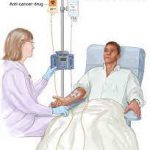Table of Contents
Why is docetaxel and ramucirumab prescribed?
Docetaxel and ramucirumab are two anticancer treatments that are given in combination to patients with metastatic lung cancer to help shrink tumors and decrease symptoms of their disease. While treatment may help some patients live longer, it is not commonly given with the goal of cure.
Docetaxel is a chemotherapy medicine designed to kill or slow the growth of lung cancer cells. Ramucirumab is a targeted therapy drug that binds to growth factor receptors located on the surface of lung cancer cells, called VEGFR-2, that signal the cell to make new blood vessels. Ramucirumab stops this signal, making it difficult for cancer to grow.
How should docetaxel and ramucirumab be used?
You will be given docetaxel and ramucirumab in the chemotherapy day unit by a chemotherapy-trained nurse. Your team will usually give you anti-sickness (anti-emetic) drugs before the treatment. These anticancer drugs can be given through:

- a short thin tube the nurse puts into a vein in your arm or hand (cannula)
- a fine tube that goes under the skin of your chest and into a vein close by (central line)
- a fine tube that is put into a vein in your arm and goes up into a vein in your chest (PICC line).
Your nurse will give you docetaxel and ramucirumab through a drip (infusion). Each of these drugs take 1 hour to administer.
What side effects can docetaxel and ramucirumab cause?
Docetaxel and ramucirumab may cause side effects. Tell your doctor if any of these symptoms are severe or do not go away:
- Infection
- Neutropenia
- Bleeding
- Anemia
- Joint Pain
- Constipation
- Fatigue
- Headache
- Hair Loss
SERIOUS SIDE EFFECTS
If you experience any of these symptoms, call your doctor immediately:
- Kidney dysfunction
- Second cancer
- Heart damage
- Liver problem
In case of emergency/overdose
Contact your doctor or nurse immediately if you have signs of infection or any other serious side effect.
What other information should I know?
It is important for you to keep a written list of all of the prescription and nonprescription (over-the-counter) medicines you are taking, as well as any products such as vitamins, minerals, or other dietary supplements. Bring this list each time you visit a doctor or if you are admitted to a hospital. It is also important information to carry with you in case of emergencies.
